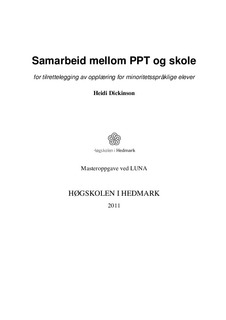Samarbeid mellom PPT og skole: For tilrettelegging av opplæring for minoritetsspråklige elever
Master thesis
Permanent lenke
http://hdl.handle.net/11250/132708Utgivelsesdato
2011Metadata
Vis full innførselSammendrag
Norsk: Målet med denne oppgaven er å utforske hvilke muligheter som kan ligge i samarbeidet
mellom PPT og skole for å bedre de minoritetsspråkliges elevenes opplæringstilbud.
Problemstillingen tar utgangspunkt i Opplæringslovens § 5-6, som sier at PPT skal hjelpe
skolen i arbeidet med kompetanseutvikling. Oppgaven omhandler både elevgruppas
forutsetninger og behov, og muligheter for kompetanseutvikling i det tverretatlige
samarbeidet. Dette er to omfattende temaer, og oppgaven favner derfor bredt for å få innsikt
i kompleksiteten relatert til opplæringstilbudet og samarbeidet for å utvikle dette.
På bakgrunn av dette er følgende problemstilling valgt: Hvordan kan PPT bidra til
kompetanseutvikling i skolen for tilrettelegging for minoritetsspråklige elever?
Til oppgaven er det gjennomført en empirisk undersøkelse i 4 landkommuner med
dokumentanalyse og brev som metode. I dokumentanalysen er lokale planer eller
retningslinjer om de minoritetsspråklige elevenes opplæringstilbud og for det tverretatlige
samarbeidet undersøkt. Gjennom brevundersøkelsen er det innhentet informasjon fra
ansatteved fire skoler to interkommunale PP-tjenester. Skolene og PP-tjenestene i
undersøkelsen samarbeider. Det er gjennomført en komparativ analyse der empirien i
brevene sammenstilles og drøftes i lys av hverandre og teori.
Oppgaven har et sosiokulturelt perspektiv, og bygger blant annet på teori fra Engen &
Kulbrandstad og Cummins om minoritetsspråkliges behov. Elevenes læringsutbytte ses også
i lys av blant annet Befrings teori om styrkebasert tenkning, og Vygotskys teori om læring.
Relatert til samarbeid og kompetanseutvikling trekkes inn blant annet Bjørnsruds og Lave &
Wengers teorier om læring i organisasjoner, og Grimens teori om profesjonell identitet,
skjønnsutøvelse og tillit.
Funnene i undersøkelsen viser at det finnes kompetanse om sosiokulturelle og språklige
faktorers betydning for de minoritetsspråklige elevenes læringsutbytte både i skole og PPT.
Samtidig er det generelt behov for å heve kompetansen i skolene, særlig knyttet til
betydningen av forforståelse og kulturelt mangfold for identitetsbygging og berikelse for
skolemiljøet. Kunnskapen som finnes, ser ut til å innehas av enkeltpersoner og ikke prege
institusjonene eller kulturene. Både faktorer knyttet til relasjoner, men særlig knyttet til
system, kan se ut til å kunne videreutvikles for å sikre at kunnskap som finnes kan overføres
undervisningspersonalet, og komme de minoritetsspråklige elevene til gode. English: The aim of this thesis is to examine the possibilities one might find in the collaboration
between Pedagogical-Psycological services and schools, to improve the education of
minority students. The research question is based on § 5-6 in the Norwegian Law of
Education, which states that the Pedagogical-psychological service has a duty in aiding
schools in developing competence. The thesis deals both with the abilities and challenges of
minority students, and possibilities of developing competence through interdepartmental
cooperation. These are two extensive subjects, and the thesis has accordingly a broad
perspective in order to capture the complexity related to the educational issues at stake, and
the collaboration for development of teachers` competence.
Based upon this, the following research question is raised: How can the Pedagogical-
Psychological service contribute in the development of knowledge in schools related to
the organizing of the education for minority students?
An empirical, quality case study has been carried out, exploring the cooperation between
schools and the Pedagogical-Psychological service and schools in 4 communities. The study
includes a document analysis, and letters has been used as a method, where the informants
have written letters describing and exploring their thoughts and experiences relevant to the
topic.
The thesis emphasis a social and cultural perspective, based on theories by Engen &
Kulbrandstad and Cummins related to minority students. Theories concerning teaching
methodologies by Befring and Vygotsky are also emphasized. Regarding collaboration and
development of competence, theories by Lave & Wenger and Bjørnsrud are referred to, as
well as Grimens theory related to professional identity and trust.
The analysis shows that competence regarding the significance of cultural factors and
language proficiency can be found both in schools and Pedagogical-Psycological service.
Simultaneously, the analysis shows the need of further development of both competence and
awareness in schools, especially related to social and ethnic understanding. The knowledge
found is held by individuals in the system, and cannot be recognized as part of the schools
common knowledge. The informants point out both factors regarding the relations between
co-workers, and systemic factors that can be addressed in order to improve the education for
the minority students.
Beskrivelse
Mastergradsoppgave i tilpasset opplæring, Avdeling for lærerutdanning og naturvitenskap, Høgskolen i Hedmark, 2011.
